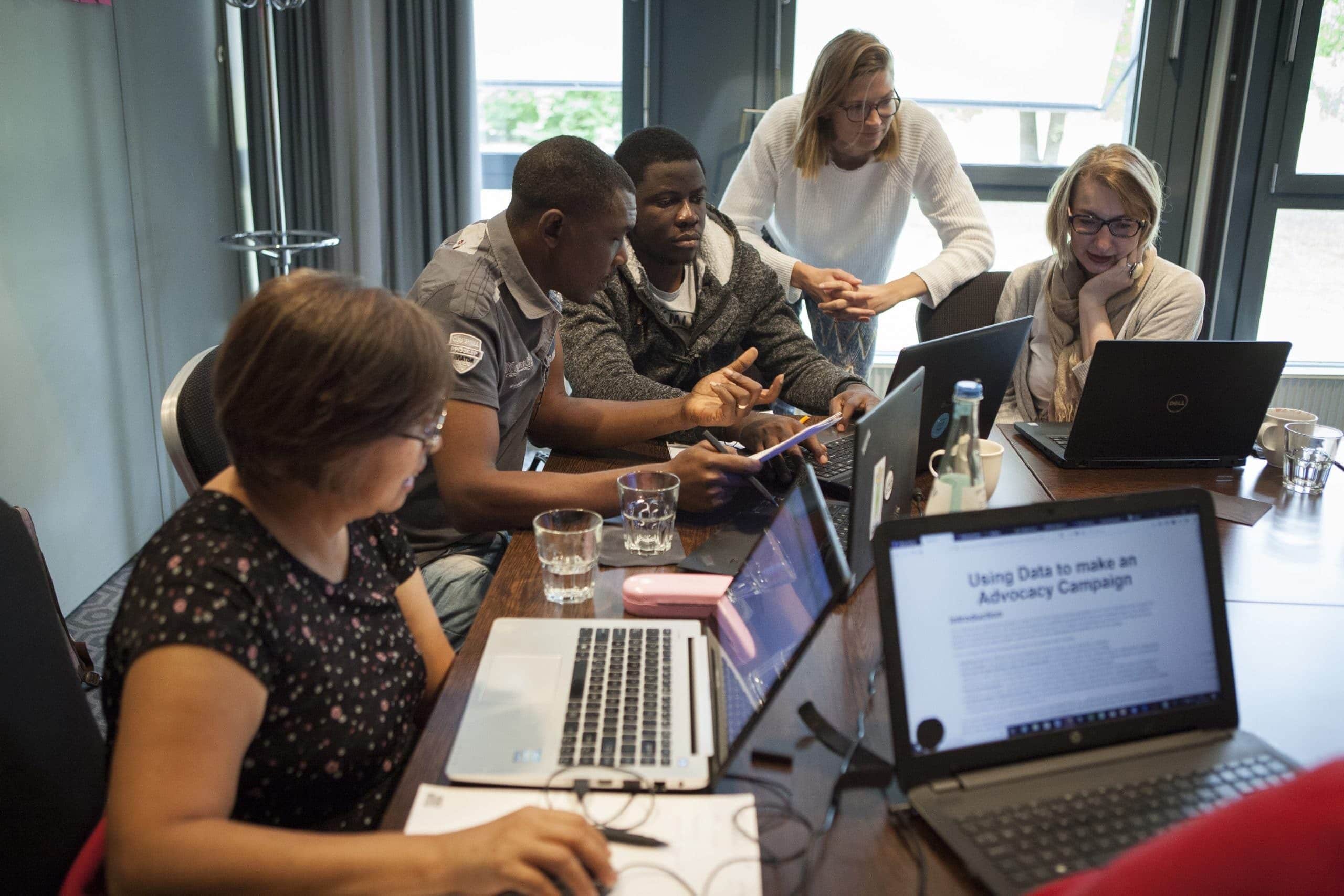Challenges for champions taking up a Book Sprint
Our champions talk about their obstacles when organising a Book Sprint

Facilitating a group of participants during a Book Sprint
What characterises the champions who advocate for innovative methods? What are their challenges, and how can we support them? This blog post is the first of a series focusing on the people we work with — our champions. Many innovative work cultures and methods, such as Book Sprints, build on collaboration, level hierarchies, meaningful engagement, shared ownership, digital tools, and facilitation techniques.
Anyone who has advocated for new methods in their work environment probably has a similar story to tell: there are quite some obstacles to overcome. To learn more about these challenges, we asked our champions who have organised Book Sprints in the past in a dozen in-depth interviews.
From learning about Book Sprints to actually getting approval for a specific book project, it can be a long way. The person who initiates the project, the Book Sprints champion, often has to go through a tough approval process to get the budget and their colleagues’ trust and time for this collaborative process.
Many of these challenges will also be familiar to champions of other new methods: Establishing trust, working with a team’s complexity and power dynamics, defining and measuring the value, and working with budget and time constraints.
Challenges to get a Book Sprint approved
Establishing trust in the process
If a method is different from what you know, you probably won’t get the full picture until you experience it, now matter how much you learn about it beforehand.
It can be difficult to grasp – and trust! – what exactly a Book Sprint offers. Writing a book in 5 days is a great story to tell… if you’ve been there yourself. If you have never done it but would love to try it, how can you convince others that it can actually work?
“The hard part of getting the buy-in was the unknown.”
According to the interviews with our champions, during a 5-day Book Sprint, day one is usually filled with doubts. By the end of the day everyone is committed to the process, and by day three or four people tend to become believers. Once people have survived their first Book Sprint with us, they come back to the next one with a knowing look and explain to others how tough, and how rewarding, it will be.
The champions who organise Book Sprints with us are often pioneers in a new field. Getting the important stakeholders in their field to devote five full days to the Book Sprint can be a big thing to ask.
Once they have done it for the first time, they set an example for their peers. By now there are hundreds of books from our Book Sprints in a range of subject areas to share, and to give the pioneers more confidence.
Working with teams’ complexity and power dynamics
A Book Sprint is a collaborative, non-hierarchical process. When it is applied to institutional hierarchies, the power dynamics become apparent. That can lead to tensions, but also to transformation.
One of the Book Sprint champions shared their challenges to set up the right team of writers:
The most difficult part is finding the right balance for the Book Sprint, and you don’t know until you’re there. It’s about personalities, people are too dominant or not participating enough, shy, etc. That’s where the role of the facilitator is extremely important. Lay out the ground rules in the beginning and uphold them throughout the process.
For some champions, a collaborative attitude is more important than the subject-matter knowledge that participants bring. If tensions do arise, our facilitators can mediate quite a lot of these, and make sure that the group stays on track nevertheless.

Participants brainstorming on content and book structure
Understanding the value of the outcome
Defining and measuring impact and return of investment is tricky for many projects. Even more so for a method you haven’t tested out yet.
In the case of a Book Sprint, the outcome is of course a book. But with each book, champions are trying to achieve different goals: Educating their community, providing learning materials for workshops, convincing potential clients of their knowledge, establishing themselves as a thought leader in their field, and so on. None of these goals is easily translated into metrics.
To the participants, the value of a Book Sprint goes beyond the book. The process itself can be impactful on a personal level and for a team.
Over the past years, we have asked participants in a feedback survey about their expectations, and how these matched with what they actually experienced. In many cases, their experiences exceeded their expectations, especially in terms of
- the in-depth exchange of ideas,
- community and team building,
- in clarifying project goals,
- improving internal processes,
- and improving organisational dynamics.
Other outcomes of a Book Sprint that people shared with us were:
- Advancing their career;
- acquiring a new set of skills;
- great networking;
- improving the documentation,
- establishing thought leadership and authority on a topic;
- using the book as a relevant asset for marketing;
- learning new collaborative methods, and more.
Measuring these kinds of soft outcomes and converting them into ROI takes some creative solutions. This is often asked of the champions in order to justify the investment of time and budget. The value of such a process is often better storified than measured, but most champions cannot can’t get around numbers.
Working with budget and time constraints
It is a lot to ask to get the full attention of several experts for 5 intense days. Or in the case of virtual Book Sprints, 10 slightly less intense days.
However, when our champions compare the time investment with their usual process of creating a publication, it is usually still more efficient. For example, we often get requests from software companies to help them write and release a book in time for a release at the next big expo. If they hired a tech writer, it can take them months to a year to get a good mental picture, and to gather all the relevant information from architects, admins, and the marketing team. Over that period, each of them might actually invest more time than the five days of a Book Sprint.
Especially if the topic is hot and the book is highly requested, it makes sense to get it out there as fast as possible.
Another challenge is to justify the cost of facilitation. The value of a professional external facilitator is not necessarily recognised in all work environments. Facilitation is at the core of our method and ensures the high productivity and quality of the collaborative process. Once participants have seen it at work, they understand its value.
Therefore, we do our best to work with the budget constraints of our champions as best as we can. For new clients and projects we love to support, we can sometimes grant a form of co-sponsorship and work at or below cost.
Understanding the challenges of champions adopting new methods
These are the challenges we have heard about from the Book Sprints champions of new methods. Are these similar to the ones you have encountered when adopting other kinds of new methods?
The survey and the Champions for innovative methods blog post series are a step towards understanding their needs and challenges.
For anyone who identifies as innovators, intrapreneurs and champions, please participate in the survey!
